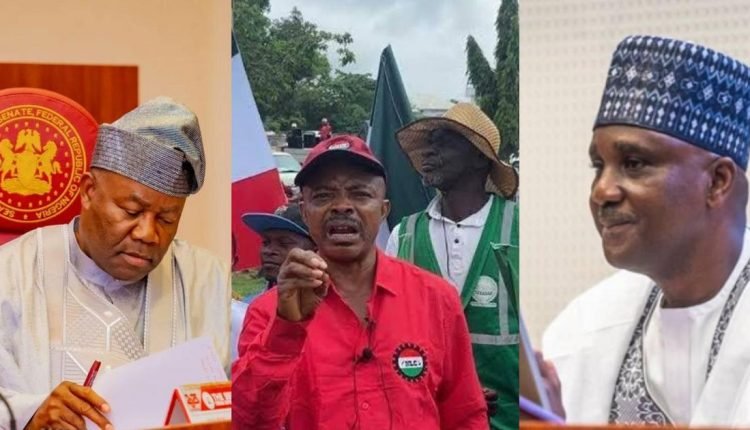In a bid to prevent a looming nationwide strike, key leaders of Nigeria’s National Assembly engaged in urgent discussions with the Organised Labour in Abuja on Sunday evening. The industrial action, set to begin on Monday, June 3, 2024, threatens to significantly impact the nation’s populace and economy.
Senate President Godswill Akpabio and Speaker of the House of Representatives Tajudeen Abbas led the National Assembly delegation. They met with Joe Ajaero, President of the Nigeria Labour Congress (NLC), and Festus Osifo, President of the Trade Union Congress (TUC). Also present were the Chairmen of the Senate and House Committees on Labour, Employment, and Productivity, Diket Plang, and Adegboyega Adefarati.
The meeting aimed to dissuade the labour unions from proceeding with their planned strike over a new national minimum wage and a recent hike in electricity tariffs. The unions argue that the current minimum wage of ₦30,000 is insufficient for the average Nigerian worker, especially since not all state governors are complying with the wage standards set in 2019. This wage agreement, which expired in April 2024, mandates a review every five years to address economic changes.
The impasse between the Federal Government and the unions has been ongoing, with the unions rejecting multiple government offers, the latest being ₦60,000. Labour leaders are steadfast in their demand for a new minimum wage of ₦497,000, citing the severe economic challenges faced by workers.
After the government failed to meet the unions’ demands by the May 31 deadline, a nationwide strike was declared, scheduled to commence on June 3. This move comes after labour negotiations with the government stalled, with both the NLC and TUC withdrawing from discussions.
The National Assembly’s intervention highlights the critical nature of the situation, as an industrial action of this magnitude could paralyze various sectors and exacerbate the country’s economic woes. The outcome of these last-minute talks remains crucial in determining whether the strike will proceed or be averted.
The labour unions have emphasized the urgency of addressing workers’ economic conditions and ensuring that the minimum wage reflects the current cost of living. As the nation awaits the outcome of these high-stakes discussions, the hope is that a resolution will be reached that satisfies both the government and the labour unions, thereby averting a potentially crippling strike.

